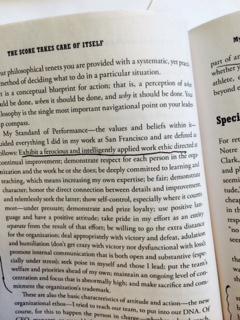So, you want to be a great coach? My guess is you love the game and you enjoy making a difference in young people’s lives. What’s the one thing you can do to help excel in the profession that most people fail to appreciate? Start studying leaders! Please do not be mistaken, coaching is leadership!. I am thoroughly convinced that an elite basketball or football coach could quickly develop an elite baseball program with little or no knowledge about the intricacies of the sport. Running a program (or business) consists of developing a compelling vision, relentlessly communicating that vision, inspiring others (and yourself), and taking massive action to be successful. The best news is you do not have to be a trailblazer; there is no shortage of incredible leaders to analyze. During the past 15 years I have been obsessed with learning what the best do better than everyone else. This is the first of a three-part series on how to increase your leadership knowledge. The first post will focus on what to read, the second part will discuss learning from observing and listening, the third post will focus on surrounding yourself with people who are passionate about success. The first key to your leadership development is getting your nose in a book.
1. READ, READ, READ, READ
That’s right, turn the TV off, open up a book and get to work. When I was 25 I heard that a good goal was to read a book a week for a year. If you were to read a book a week for 10 years straight you would have dominated 520 books! Think about how much leverage you would possess over your competition with that type of knowledge. Now, I cannot say that I have read 520 books in the last 10 years but I’ve gotten pretty darn close.
Another great way to gather knowledge is through articles and blogs. If you follow leaders and inspiring people on Twitter you will find thought-provoking information every day. Below are three articles I have found useful within the last month:
Why Bill Gates and Warren Buffett are so successful, in one word
Dont Follow Your Passion, Follow Your Effort
http://www.barnetttalks.com/2014/11/the-red-queen.html?m=1
I know you are wondering, what are my favorite book recommendations? Here are five leadership books that have made a huge impact on me.
A. “Jack Welch- Straight From the Gut”. A look at the business strategy of the former General Electric CEO. If you are interested in learning about a tough, decisive and no thrills leader this is your book.
B. “Talent is Overrated”-Geoff Colvin- This was the first time I ever heard about the 10,000 hour theory that became popular in Malcolm Gladwell’s book “Outliers” (another incredible read). Colvin’s idea about “deliberate practice” shapes every practice session in our program.
C. “The Score Takes Care of Itself”- Bill Walsh- We leaned on this book heavily during my first year at Denison. I felt an energy rush when I learned about his “Standard of Performance.”
D. “The Effective Executive”- Peter Drucker- I get excited just thinking about Drucker’s information. His statement that effective executives: “Run productive meetings” and “focus on opportunities rather than problems” changed the way I looked at things.
E. “Awaken The Giant Within”- Anthony Robbins- If you are not reading and listening to Anthony Robbins you are missing a big opportunity. Nothing more needs said.
Right now many of you are thinking, “I don’t like to read.” Or, worse yet, “I like to read but I don’t have enough time.” Reading helps bridge the gab between mediocrity and excellence; therefore, I have learned to love to read and carved out the necessary time to make it happen. The same people that proclaim they do not have enough time will: watch between 6-10 hours of football this weekend, watch three runs of SportsCenter, watch reruns of Seinfeld and Friends, or play video games every night. If you decide not to read it’s your choice; it is not because of constraints on your time.
That’s right, Coaches- I just provided you three articles and five books and not one involved baseball. And yes, I believe that reading about leadership will do more for your career than “mastering the mental game,” differentiating between a rotational or linear swing teach, or whether you should field the back hand off the front foot or back foot. While the intricacies of the sport are great to debate, the importance of leadership is non-negotiable. Behind every great organization is a strong leader. What are you willing to invest to become a great leader for your organization???
Please be on the lookout on Sunday for Part Two of Studying Leaders: Learning From Observing and Listening.
Happy Thanksgiving!!
Mike Deegan
P.S. Please share what books or articles have made an impact on you.






